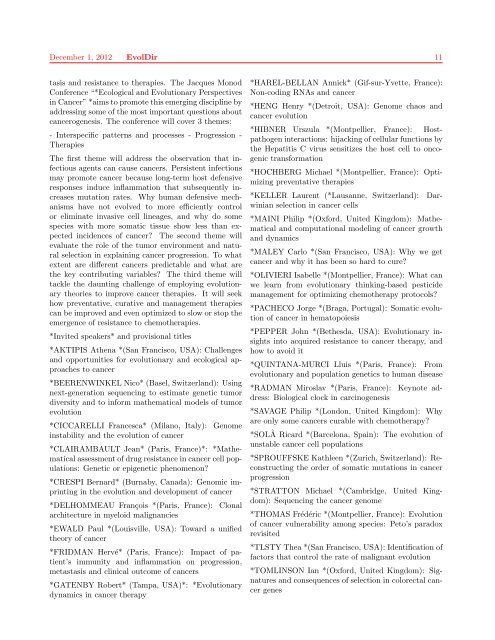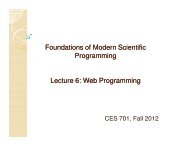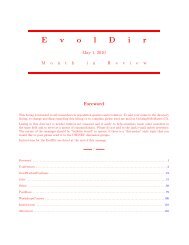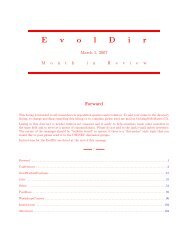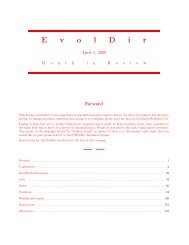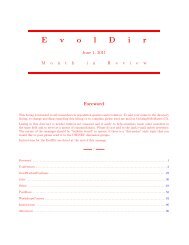E v o l D i r
E v o l D i r
E v o l D i r
Create successful ePaper yourself
Turn your PDF publications into a flip-book with our unique Google optimized e-Paper software.
December 1, 2012 EvolDir 11<br />
tasis and resistance to therapies. The Jacques Monod<br />
Conference “*Ecological and Evolutionary Perspectives<br />
in Cancer” *aims to promote this emerging discipline by<br />
addressing some of the most important questions about<br />
cancerogenesis. The conference will cover 3 themes:<br />
- Interspecific patterns and processes - Progression -<br />
Therapies<br />
The first theme will address the observation that infectious<br />
agents can cause cancers. Persistent infections<br />
may promote cancer because long-term host defensive<br />
responses induce inflammation that subsequently increases<br />
mutation rates. Why human defensive mechanisms<br />
have not evolved to more efficiently control<br />
or eliminate invasive cell lineages, and why do some<br />
species with more somatic tissue show less than expected<br />
incidences of cancer? The second theme will<br />
evaluate the role of the tumor environment and natural<br />
selection in explaining cancer progression. To what<br />
extent are different cancers predictable and what are<br />
the key contributing variables? The third theme will<br />
tackle the daunting challenge of employing evolutionary<br />
theories to improve cancer therapies. It will seek<br />
how preventative, curative and management therapies<br />
can be improved and even optimized to slow or stop the<br />
emergence of resistance to chemotherapies.<br />
*Invited speakers* and provisional titles<br />
*AKTIPIS Athena *(San Francisco, USA): Challenges<br />
and opportunities for evolutionary and ecological approaches<br />
to cancer<br />
*BEERENWINKEL Nico* (Basel, Switzerland): Using<br />
next-generation sequencing to estimate genetic tumor<br />
diversity and to inform mathematical models of tumor<br />
evolution<br />
*CICCARELLI Francesca* (Milano, Italy): Genome<br />
instability and the evolution of cancer<br />
*CLAIRAMBAULT Jean* (Paris, France)*: *Mathematical<br />
assessment of drug resistance in cancer cell populations:<br />
Genetic or epigenetic phenomenon?<br />
*CRESPI Bernard* (Burnaby, Canada): Genomic imprinting<br />
in the evolution and development of cancer<br />
*DELHOMMEAU François *(Paris, France): Clonal<br />
architecture in myeloid malignancies<br />
*EWALD Paul *(Louisville, USA): Toward a unified<br />
theory of cancer<br />
*FRIDMAN Hervé* (Paris, France): Impact of patient’s<br />
immunity and inflammation on progression,<br />
metastasis and clinical outcome of cancers<br />
*GATENBY Robert* (Tampa, USA)*: *Evolutionary<br />
dynamics in cancer therapy<br />
*HAREL-BELLAN Annick* (Gif-sur-Yvette, France):<br />
Non-coding RNAs and cancer<br />
*HENG Henry *(Detroit, USA): Genome chaos and<br />
cancer evolution<br />
*HIBNER Urszula *(Montpellier, France): Hostpathogen<br />
interactions: hijacking of cellular functions by<br />
the Hepatitis C virus sensitizes the host cell to oncogenic<br />
transformation<br />
*HOCHBERG Michael *(Montpellier, France): Optimizing<br />
preventative therapies<br />
*KELLER Laurent (*Lausanne, Switzerland): Darwinian<br />
selection in cancer cells<br />
*MAINI Philip *(Oxford, United Kingdom): Mathematical<br />
and computational modeling of cancer growth<br />
and dynamics<br />
*MALEY Carlo *(San Francisco, USA): Why we get<br />
cancer and why it has been so hard to cure?<br />
*OLIVIERI Isabelle *(Montpellier, France): What can<br />
we learn from evolutionary thinking-based pesticide<br />
management for optimizing chemotherapy protocols?<br />
*PACHECO Jorge *(Braga, Portugal): Somatic evolution<br />
of cancer in hematopoiesis<br />
*PEPPER John *(Bethesda, USA): Evolutionary insights<br />
into acquired resistance to cancer therapy, and<br />
how to avoid it<br />
*QUINTANA-MURCI Lluis *(Paris, France): From<br />
evolutionary and population genetics to human disease<br />
*RADMAN Miroslav *(Paris, France): Keynote address:<br />
Biological clock in carcinogenesis<br />
*SAVAGE Philip *(London, United Kingdom): Why<br />
are only some cancers curable with chemotherapy?<br />
*SOLÃ Ricard *(Barcelona, Spain): The evolution of<br />
unstable cancer cell populations<br />
*SPROUFFSKE Kathleen *(Zurich, Switzerland): Reconstructing<br />
the order of somatic mutations in cancer<br />
progression<br />
*STRATTON Michael *(Cambridge, United Kingdom):<br />
Sequencing the cancer genome<br />
*THOMAS Frédéric *(Montpellier, France): Evolution<br />
of cancer vulnerability among species: Peto’s paradox<br />
revisited<br />
*TLSTY Thea *(San Francisco, USA): Identification of<br />
factors that control the rate of malignant evolution<br />
*TOMLINSON Ian *(Oxford, United Kingdom): Signatures<br />
and consequences of selection in colorectal cancer<br />
genes


